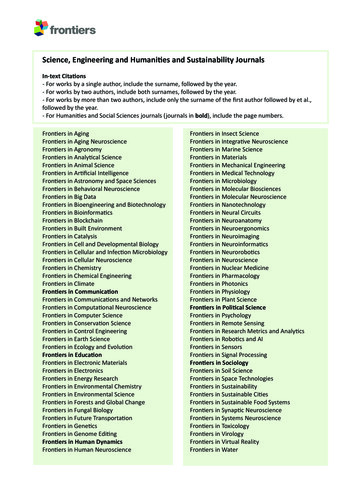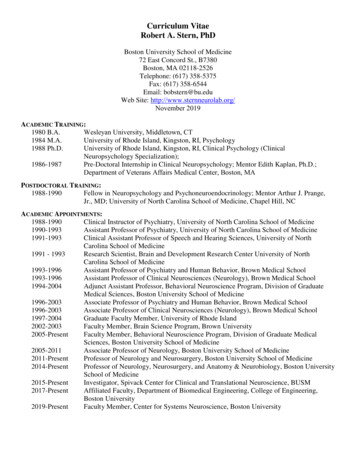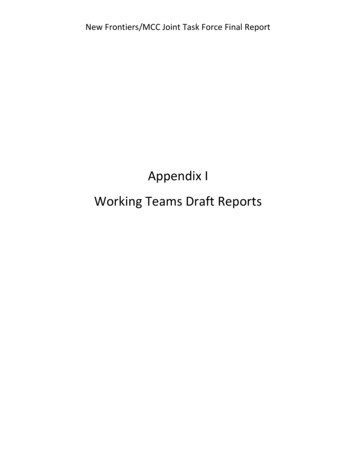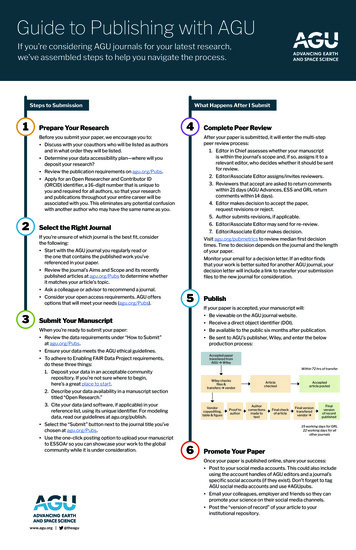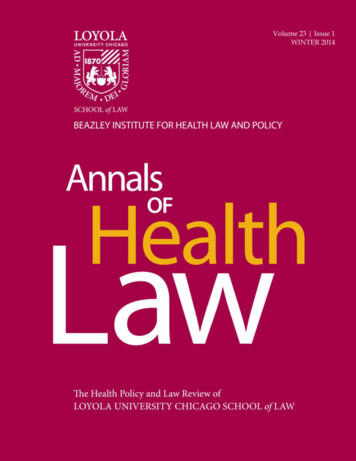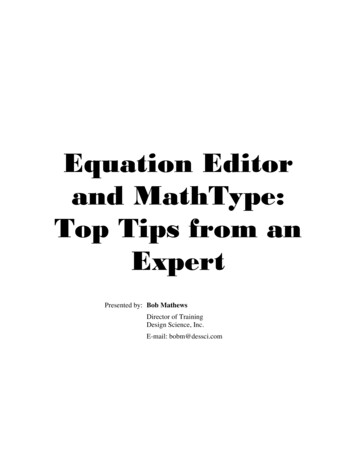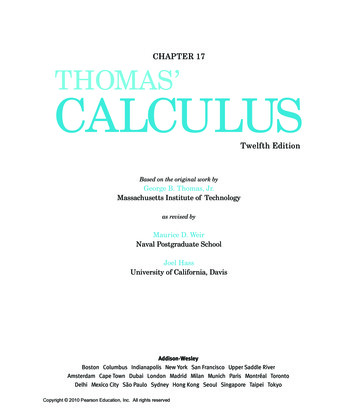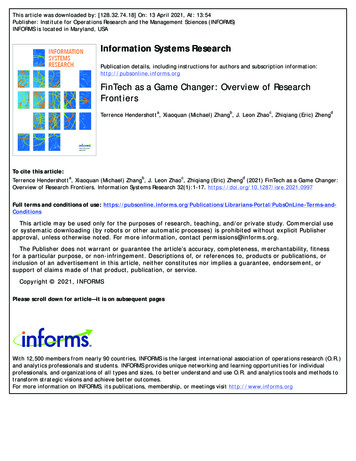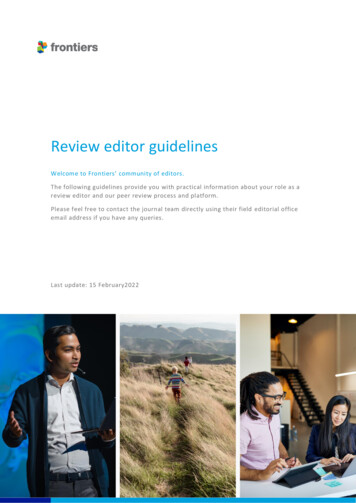
Transcription
Review editor guidelinesWelcome to Frontiers’ community of editors.The following guidelines provide you with practical information about your role as areview editor and our peer review process and platform.Please feel free to contact the journal team directly using their field editorial officeemail address if you have any queries.Last update: 15 February2022
CONTENTS12Review editors .31.1Responsibilities .41.2Contact your editorial office .4Our unique peer review .52.1Initial validation .52.2Associate editor assignment.62.3Review editor assignment .62.3.12.4Independent review .82.5Interactive review .112.6Making a recommendation .122.6.1Endorsing for publication .122.6.2Withdrawing and/or recommending rejection .132.73Declare conflicts of intersest .6Final decision and validation .13FAQ.143.1Extension request .143.2Wrong revision level suggested/premature endorsement .143.3Setting yourself out of office .15NOTE: The following guidelines mention both “Review editors” and “reviewers”. While theformer specifically refers to review editors on the editorial board, the latter encompasses bothreview editors and external reviewers invited by the associate editors to review specificmanuscripts.
1 REVIEW EDITORSThe primary role of review editors is to act as reviewers in the peer-review of submittedmanuscripts.Along with associate editors, review editors are the key persons of the Frontiers reviewprocess, since they are responsible for certifying the validity and accuracy of publications, andfor helping authors to improve the quality of their manuscripts as well as the way in which theresearch is communicated.When joining our community of review editors, please familiarize yourself with theseguidelines and watch the video linked in the Frontiers platform to get a clear view of your rolein peer review at Frontiers*.*Please note that the video is not available in China. For those editors based in China, please request a.zip file from the editorial office.
1.1 RESPONSIBILITIESThe mandate for reviewers is to ensure that experiments and studies were conductedcorrectly, taking into account appropriate ethical considerations, and that the conclusions arebased on a valid, logical interpretation of the results.Reviewers are obliged to: keep all manuscript files and review reports confidential. These should only be sharedwith the authors and the handling editor of the manuscript in the review forum.Posting of the review report publicly is prohibited.refrain from disclosing their identity to the authors and other reviewer(s) until aftercompleting the review process.refrain from using inappropriate language and unconstructive behavior. This will notbe tolerated and may result in a reviewer being revoked from the assignment and, inmore serious cases, from the editorial board.ensure a timely review by completing their assignment as soon as possible and bynotifying the handling editor and Editorial Office of any expected delays immediately.Please see additional guidelines for reviewers issued by the Committee on Publication Ethics,that detail further ethical obligations of reviewers, here.1.2 CONTACT YOUR EDITORIAL OFFICEShould you have questions regarding any of the following, please see the contact guide belowto direct your query to the appropriate party:Potential conflict of interest,review process, technicalqueries[journal ftware issuessupport@frontiersin.orge.g., ls of your editorial role[journal name]@frontiersin.orge.g., microbiology@frontiersin.org
2 OUR UNIQUE PEER REVIEWThe Frontiers collaborative review process has been designed to validate high-quality scholarlycontributions by fostering objectivity, rigor, and iterative collaboration. Associate editors andreviewers are acknowledged publicly on all published articles.The review process is composed of seven stages: Initial Validation, Editorial Assignment,Independent Review, Interactive Review, Review Finalized, Final Validation and Final Decision.Review editors join the process at the stage of the Independent Review and follow discussionswith authors through Interactive Review until they are ready to make their final decision.2.1 INITIAL VALIDATIONTo support you in ensuring the quality of the manuscripts, all submissions, includingsubmissions to your Research Topic undergo standard initial quality checks by the ResearchIntegrity team. All submissions are pre-screened for: Textual overlap with and similarity to published materialPotential image or data manipulationLanguage qualityAdherence to editorial policiesAdherence to ethical standardsPotential conflicts of interestIf issues are identified in manuscripts you are handling, the Research Integrity team will notifyyou and the authors as part of our standard procedure. No action is required from you unlessspecifically requested.For more information on the Frontiers Research Integrity policies and the activities of ourResearch Integrity team visit s and watchour webinar on YouTube or BiliBili.
2.2 ASSOCIATE EDITOR ASSIGNMENTFollowing completion of these initial checks, appropriate associate editors or topic editors areinvited to handle the manuscript.Once an associate editor has accepted to handle the review process of a manuscript, it issubjected to an initial assessment - an editor may either decide to send the manuscript out forreview or recommend it for immediate rejection to the specialty chief editor. Manuscripts mayonly be rejected without peer-review for the following reasons: An objective error (i.e. an error that is generally recognized by the community)Language errors that render the research incomprehensibleSubstantially below standard research qualityLack of appropriate ethical considerations and/or non-compliance with ethical standardsShould the manuscript be suitable for review, the handling editor will be asked to securereviewers (minimum of 2 for the full-length article types, but they may of course assign more),either selected from the editorial board or invited externally among experts in the field.If reviewers have not been assigned within 7 days, invitations will be sent to the most relevantreview editors from the editorial board.2.3 REVIEW EDITOR ASSIGNMENTThe following sections will explain step by step how to proceed in the next stages of the peerreview process once you get invited to review a manuscript.2.3.1Declare conflicts of intersestWhen accepting a review invitation, you will be requested to fill out the acceptancequestionnaire to confirm that you do not have any conflicts of interest (COI) which mayprevent you from completing your review assignment.If you have nothing to declare, you will be able to accept the assignment and gain access to themanuscript straight away. Should you need to declare a relationship with the handling editoror any of the authors your ability to accept the assignment yourself will be disables and youwill be asked to contact the Editorial Office to elaborate on your relationship. If therelationship is deemed permissible the Editorial Office will be able to assign you directly asreviewer for the manuscript.NOTE: Review editors should not accept assignments if they have a close professionalrelationship with the handling editor, which in their view could affect the objectivity of thereview.
Actual or potential conflicts of interest must be reported both to the journal's Editorial Officeand to the handling editor of the manuscript. Further details on the information that needs tobe disclosed can be seen in the table below. In case of doubt, please contact the FrontiersEditorial Office.FAMILY1. Are any of the authors a spouse orsignificant other, a member of the samefamily or a very close personal friend?Review editors should also not be a memberof the same family as the handling editor.COLLABORATIONS2. Are you currently hosting or have hosted aFrontiers Research Topic with any of theauthors within the past 2 years? Are youcurrently hosting a Frontiers Research Topicwith the editor?3. Are you currently collaborating or have youcollaborated on a research project or apublication with any of the authors within thepast 2 years?4. Are you currently collaborating or have youcollaborated with any of the authors as anadvisor or in any other direct supervisorycapacity in the past five years?5. Are you currently collaborating or have youcollaborated with any of the authors as astudent or in any other direct subordinatecapacity in the past five years?AFFILIATION6. Are you affiliated with the same institution asthe editor? Are you affiliated with the sameinstitution as any of the authors? If so, hasthis resulted in interactions, collaborations, ormutual interests with the authors that wouldcompromise your impartiality in conductingthis review?7. Are you a current member of a committee ordepartment that coincides with an affiliationwith the editor or any of the authors?
FINANCIAL8. Do you have a business or professionalpartnership with any author?9. Do you have financial interests or businessrelations with any organization involved inthis research or in the preparation of themanuscript?10. Do you have any financial interest in thecontent of the manuscript that might affectyour ability to perform an objective review?2.4 INDEPENDENT REVIEWUpon assignment you will get access to the Review Forum to download the manuscript and allrelated files as well as to provide your online review report structured into a questionnaire,which varies based on the article type. You are requested to complete this task as soon aspossible, and no later than 7 days after accepting the assignment. Your constructivecomments will provide authors with valuable feedback in order to improve their manuscript.Should you be unable to complete your assignment within the 7 days, a deadline extension canbe granted. Please see section 3.1 for more information.NOTE: Your review assignments and pending tasks are displayed in the MyFrontiers dashboardaccessible from the top navigation bar once you log in.
The image shows the review forum. On the right-handside, you will find options to:1. Download the latest version of the manuscript2. Access all related files3. Withdraw from the process, should you not havetime to continue the review or should there be aconflict of interest4. Recommend rejection to the handling editorshould you find any objective errors in themanuscriptTo submit your independent review report, visit the review forum and fill out the relevantsections (see screenshot below). The independent review report questionnaire is comprised ofa number of questions and a checklist specifically designed for each article type as well as asection to assess the quality of the manuscript.You may select the “Save and Resume Later” option at any stage, should you still be drafting.Once the review report is ready, simply press “Submit My Report” at the top, so that yourcomments may be sent to the associate editor. If needed, you can still make changes to yourreport after it has been submitted, up until the Interactive Review Forum is activated by theassociate editor.During review, you will also have the option to submit PDF files to complement your review.One file per question can be submitted. Please note that these files are not meant to replacethe review report, but can of great use should you wish to comment on a figure or highlightspecific sections of the manuscript.
Once you have completed the report, you will be able to provide a recommendation to theeditor: Minor revisions - Manuscript can be acceptedRevision is requiredSubstantial revision is requiredShould you recommend that the manuscript can be accepted, you will have the option todirectly endorse the manuscript and finalize your review report. You can read more on whatendorsing means in the section Endorsing for publication (2.7).
Should the handling editor want the authors to directly respond to you in the Review Forum,they are still able to reactivate your review, where your report will become active. You willthen need to re-confirm your endorsement following the author’s response.Once all reviewers have submitted their reports, the associate editor will be automaticallynotified to activate the next phase of the review, the interactive review, which will provideauthors and reviewers access to all review reports and any comments posted in the Editor tab.The handling editor can choose to activate the review indicating minor, moderate orsubstantial revisions. The revision level is reflected in the amount of days the authors are givento prepare their responses and revision (7, 14 or 21 days).Alternatively, the handling editor can recommend rejection based on your or otherreviewer(s)’ comments by activating the interactive review with major concerns. This providesthe authors with 7 days to prepare a rebuttal. Should the handling editor choose this route,you will be revoked from the assignment. In case your expertise is needed, the handling editormay contact you following the authors’ rebuttal.2.5 INTERACTIVE REVIEWOnce the interactive review forum is activated, authors are automatically notified to enter thereview forum, where they can access the submitted reports, and have up to 30 days to addressthem and/or resubmit a revised manuscript, if necessary.Once the authors have responded, you will be automatically notified and will be asked to visitthe review forum within 7 days. You will be able to interact with the authors, other reviewer(s)and the Associate Editor through comments in the discussion forum. At this stage allreviewers’ reports and comments posted by Associate Editor in the Editor tab will be visible tothe authors and to the other review editor(s), enabling further discussion and clarification.The handling Associate Editor monitors the process to ensure the timeliness of the review andthe constructiveness of the comments. Author unresponsiveness or disputes over manuscriptcontent should be reported to both the Editorial Office (for more information on relevantcontact details, please see Section 1.2) and the handling Associate Editor.Should a dispute arise, the Associate Editor will act as a mediator, working with all partiesinvolved to resolve the issue. The review is complete once all issues/comments are addressedto the reviewers’ satisfaction.You can contact the Associate Editor directly through the review forum by selecting the blueenvelope sign next to their name (see screenshot below).
2.6 MAKING A RECOMMENDATIONWhen you are ready to make your final decision, please consider the following points: Has the final manuscript been submitted?Does the manuscript propose a suitable research question and hypothesis, supportedby relevant theory?Do the authors apply a correct and transparent methodology?Is the study design and materials clearly laid out?Is the language and presentation clear and adequate?Are figures and tables in line with scientific norms and standards?Do the authors follow Frontiers author guidelines on editorial and ethical policies?Is the manuscript grounded in existing literature through sufficient referencing anddoes it offer an appropriate coverage of the relevant literature?Ready to make your decision, here are your optionsReady for publication:Endorsethe manuscript2.6.1No longer wish to/able totake part in the review:Withdrawfrom reviewAuthors areunable/unwilling toaddress your concerns:Recommend rejectionEndorsing for publicationShould you endorse the manuscript for publication, you confirm that your comments havebeen adequately addressed by the authors. If manuscript is not yet in a publishable form,please do not endorse the manuscript.You will be able to provide the authors with any final comments you may have. Please notethat your final comments should not contain any issues that have yet to be addressed by theauthors.When finalizing your review, you will also be asked to confirm that you agree to your nameand affiliation being disclosed on the article, if published.The handling editor will be notified of your endorsement and is able to accept the manuscriptat the end of the process, if appropriate.
2.6.2Withdrawing and/or recommending rejectionShould you recommend rejection of a manuscript, you will remain anonymous, and yourrecommendation will be sent to the handling editor, who will be able to forward thisrecommendation to the Specialty Chief Editor. Should the handling editor choose to continuereview following your withdrawal and/or recommendation other reviewers may be assigned,and your report remain available in the forum.When withdrawing/recommending rejection, you will be asked to select the reason for yourdecision from a list (see screenshots below). While this is not mandatory, you are alsoencouraged to provide the handling editor with further comments. The reasons given will bevisible to the associate editor, chief editors, and Editorial Office, but will not be available to theauthors.2.7 FINAL DECISION AND VALIDATIONOnce all reviewers completed their activity in the review forum, the handling editor will beasked to make their final decision. Accepted manuscripts undergo a final quality check by theEditorial Office. Once approved, the abstract will be published online immediately, and the fullmanuscript will move on to typesetting.You will be informed once the handling editor has made their final decision.
3 FAQ3.1 EXTENSION REQUESTWhile the Frontiers platform has been designed to ensure a thorough yet rapid review process,to enable a true discussion between authors and reviewers, you may request extensions at anystage, should you need more time to complete a review. During the review, extensions may be self-granted once during the independentreview and once during the interactive review. This is done by selecting thecorresponding option in the right-hand side menu of the review forum once itbecomes available. If any additional extensions are needed, please contact theEditorial Office. Short extensions can also be requested by sending an email to the Editorial Office, whowill be able to update the system accordingly. Additional or longer extensions may be requested by contacting the Editorial Office,keeping in mind that requests for long extensions will have to be confirmed by thehandling editor as well.3.2 WRONG REVISION LEVEL SUGGESTED/PREMATURE ENDORSEMENTUpon submitting your report, you will be asked to indicate the suggested revision level. Shouldyou select the wrong option by mistake, please contact your editorial office as soon aspossible.
3.3 SETTING YOURSELF OUT OF OFFICEIf you are going to be unavailable for a short time, you can set yourself out of office in MyFrontiers for up to 28 consecutive days. For the time that you are unavailable, you will notreceive any new automatic Invitations to review. However, associate editors will still be able topersonally invite you to review.Notifications regarding any ongoing assignments or pending invitations will remain.Should you be unavailable for longer than 28 days please contact your journal team forguidance.
Review editor guidelines Welcome to Frontiers' community of editors. The following guidelines provide you with practical information about your role as a review editor and our peer review process and platform. Please feel free to contact the journal team directly using their field editorial office email address if you have any queries.
